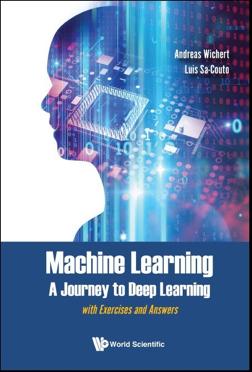An analogue method to mastering the digital

Credit: World Scientific
Have you ever wondered if it’s possible to learn all there is to know about machine learning and deep learning from a book?
Machine Learning–A Journey to Deep Learning, with Exercises and Answers is designed to give the self-taught student a solid foundation in machine learning with step-by-step solutions to the formative exercises and many concrete examples. By going through this text, readers should become able to apply and understand machine learning algorithms as well as create new ones.
The main parts of the book address linear and nonlinear regression, supervised learning, learning theory, feature extraction and unsupervised learning. The statistical approach leads to the definition of regularization out of the example of regression. Building on regression, we develop the theory of perceptrons and logistic regression. The book investigates the relation between bias and variance as a consequence of a finite training sample set that is used in machine learning. Out of backpropagation, the authors develop the theory of convolutional networks and deep learning. During the development the authors introduce the RBF networks and support vector machines that indicate why neural networks with hidden nonlinear units can solve most problems.
Throughout the book each chapter is finished with lecture notes that contain the core ideas presented in the chapter, as well as cover and go through technical issues that may have arisen, in detail. Each chapter also includes solved exercises that the reader would be able to learn from through practice. By going through the procedures in a pen and paper manner, the reader will develop a comfort and familiarity with the techniques that will become indispensable in future usage.
###
Machine Learning–A Journey to Deep Learning, with Exercises and Answers retails for US$168 / £150 (hardcover) and is also available in electronic formats. To order or know more about the book, visit http://www.
About the Authors
Andreas Wichert is an Assistant Professor at Department of Computer Science and Engineering, University of Lisbon, Portugal where he lectures on machine learning and quantum computation, since 2006. He studied computer science at the University of Saarland, where he graduated in 1993. Afterwards, he became a Ph.D. student at the Department of Neural Information Processing, University of Ulm, Germany. He has been a member of the Group of AI for People and Society (GAIPS) since 2009. His research focuses on Artificial Intelligence, Machine Learning, Neural Networks, Quantum Cognition, and Quantum Artificial Intelligence.
Luis Sa-Couto studied computer science at the Department of Computer Science and Engineering, IST, University of Lisbon, Portugal where he graduated in 2018. Since then, he is actively pursuing a Ph.D. at University of Lisbon under the supervision of Prof Andreas Wichert, studying how brain-inspired computational principles can guide the development of models that extend the applicability boundary of Deep Learning approaches. Besides research, Luis regularly gives lectures on practical classes in AI and Machine Learning at the same university.
About World Scientific Publishing Co.
World Scientific Publishing is a leading international independent publisher of books and journals for the scholarly, research and professional communities. World Scientific collaborates with prestigious organisations like the Nobel Foundation and US National Academies Press to bring high quality academic and professional content to researchers and academics worldwide. The company publishes about 600 books and over 140 journals in various fields annually. To find out more about World Scientific, please visit http://www.
For more information, contact Amanda at [email protected].
Media Contact
Amanda Yun
[email protected]
Original Source
https:/




